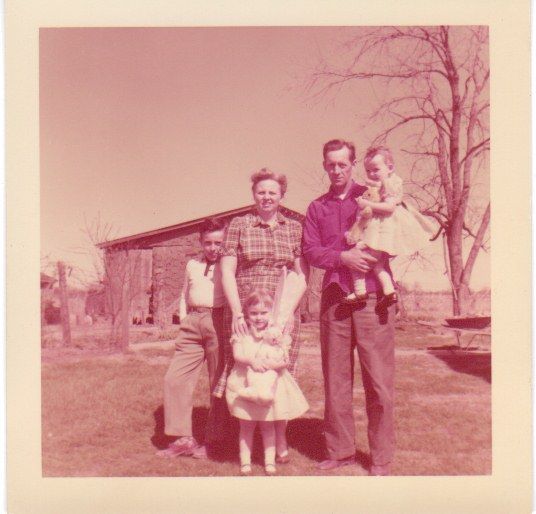
My family, Easter 1956, on my grandparents' farm. That's me in my dad's arms. Behind us is the coal shed and, beyond that, the wash house where we did laundry.
Climate alarmists can’t catch a break these days, it seems. First, about 5,000 more of those pirated emails that launched what’s commonly referred to as “Climategate” were released just before the United Nations convened its most recent climate conference in Durban, South Africa. In the Hollywood spirit, publication of this most recent spate of damning emails was dubbed “Climategate II.” Like sequels of the Hollywood variety, Climategate II seems to have failed to live up to its predecessor, at least in terms of the amount of media attention it’s managed to grab. But before global warming enthusiasts breathe a sigh of relief, the lack of media splash is most likely due to the confirmatory nature of the newly-divulged material. Same song, second verse, if you will. And, let’s face it, with the world-wide economic meltdown, global climate change is no longer a pressing issue that concerns anyone but the most militant greenies. Unfortunately, you can count Lisa Jackson, head of the U.S. Environmental Protection Agency, in that group. But I digress.

My grandparents and "Boy Dog" on their front porch. My dad tore down the barn behind them and used the wood to begin building a house of our own.
The U.N. soldiered on with their climate clambake in Durban in spite of the renewed scandal. But the attendees from the developed countries are no longer so willing to play ball with what is, essentially, a scheme to redistribute wealth from those developed countries to the third world in the form of yearly payments totaling $100 BILLION. There was no agreement to extend the Kyoto Protocol. In fact, Canada went the other way — announcing its withdrawal from the original Kyoto accord in which it had agreed to reduce its greenhouse gas emissions by 6 percent relative to its 1990 levels by next year.
The U.S. would have been wise to follow Canada’s lead. Our country’s commitment under the Kyoto agreement would require us to cut back greenhouse gas emissions to levels not seen in this country since 1910. A little research into what life was like in the U.S. in 1910 gives new meaning to the word “austerity.” Here’s a list of just a few of the modern conveniences that were not common in the America of 1910:
- electricity
- running water
- indoor plumbing
- automobiles or other motorized forms of personal travel
- central heating and cooling
- telephones
Anyone waxing nostalgic for those good old days? Not me, and I speak from experience. I actually spent a large chunk of my childhood (mid ’50s through the mid ’60s) living with my grandparents and seven other of my closest relatives in a five-room farmhouse. We did have electric lights and my grandfather owned an old car, but we lacked all of the other conveniences on the above list. Been there, done that, have the t-shirt.
In fact, since my carbon footprint was so very small in my formative years, according to the logic of modern climate orthodoxy as pronounced by the U.N., you city folks probably owe me some real money. I’ll get back to you with the P.O. box number where you can send your donations. Heck, maybe I should look into that new thing — you know — I think it’s called Paypal.
While I’m waiting for all those cards and letters and electronic payments to start rolling in, I’ll spend my time listening to what I hereby nominate as the theme song of the climate change movement. Who knew that John Fogarty was so far ahead of his time?


You must be logged in to post a comment.